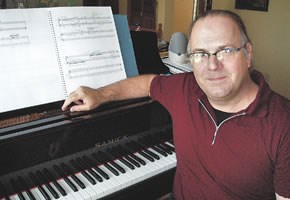Laurentian University music professor Robert Lemay is an award-winning composer. He is a semifinalist in the First Tokyo Kosei Wind Orchestra Composition Competition to be held in Japan Aug. 21. He'll learn in November if his modern music piece, Apeldoorm, Nederland, won top honours. Northern Life reporter Heidi Ulrichsen spoke to the composer recently about his career.
 NL: When did you first compose music?
RL: When I was a teenager, I was in a rock band. I composed a
couple of songs for the band. Those were for piano synthesizer
and electric guitar. I started to compose seriously when I was
in university.
NL: Why did you come to Laurentian University?
RL: My wife (music professor Yoko Hirota) and I came in 2000.
Yoko has a position in piano, and at the same time they were
happy to have somebody to teach fourth-year theory classes.
NL: Do you play a musical instrument?
RL: I used to play piano and pipe organ. But I haven't played
seriously or performed for almost 20 years. When I started my
bachelor's degree at Laval University, I didn't have any
specialization. After a year, I took a composition class. I
switched to a concentration in composition. After that, I
stopped taking piano lessons. I do play in class sometimes when
I do analysis. But it's almost a joke with students.
NL: How would you describe your music?
RL: It's very modern. It's what we call post-serial music. It's
atonal. There's no melody or functional harmony. What I try to
do is to have a very strong emotional content or an influence
from poetry. A piece of my music that won a competition in
Belgium two years ago, Ramallah, was referring to the events in
Palestine at that time. It is very emotional.
NL: Why don't you write something more
conventional?
RL: It's just not my universe. I like pop music. I don't hate
it. I like French chansons very much. But what I want to
express needs a more contemporary medium.
NL: Tell me about the piece entered in the Japanese
competition.
RL: Apeldoorm is a name of a town in the Netherlands. I went
there in 1991. I was surprised to see how Dutch people are
still thankful to Canadians. The Netherlands was liberated by
Canadians (at the end of the Second World War). I wouldn't say
that the piece is a tribute to the veterans, but at the same
time it's from my view on the war.  The other inspiration
is from a poem by Guillaume Apollinaire. He is a French writer,
and he was an ordinary solider (in the First World War). He
wrote this poem during the war.
NL: How do people react to your music?
RL: Usually it's quite good. For example, last February the
Sudbury Symphony Orchestra played my piano concerto. The
reaction of the public was very, very positive. But before the
performance, I went onstage and explained the idea behind the
piece.
NL: Who is your favourite classical composer?
RL:  I would say (Claude) Debussy and (Wolfgang Amadeus)
Mozart. But Mozart is so far away. Musically I enjoy what he
expresses, but it's not in my environment anymore. But Dubussy,
what he expresses, we can still feel it today.
NL: Who is your favourite contemporary
composer?
RL: Pierre Bulez. He's a French conductor and composer. He's
still alive.  He's one of the fathers of modern music -
all this post-serial school. Another composer whose music I
enjoy is Luciano Berio. He's an Italian composer. He died three
or four years ago.  Next February we're going to have two
concerts in a row that are kind of a tribute to Berio.
